Leadership Models: Traditional, Modern and Change Analysis
VerifiedAdded on 2022/08/14
|8
|2388
|30
Essay
AI Summary
This essay critically evaluates the statement that modern leadership models are merely rehashes of traditional ones, such as trait and behavioral models. It delves into various leadership theories, including transformational, authentic, ethical, and followership models, comparing them to the established frameworks. The essay examines the evolution of leadership, discussing the relevance of trait theory and behavioral styles like autocratic, democratic, and laissez-faire. It highlights the emergence of modern models that emphasize emotional intelligence, system thinking, and expansive leadership. Through examples of leaders like Jeff Bezos, Steve Jobs, and Nelson Mandela, the essay analyzes how these individuals have adopted and adapted leadership traits and styles to drive change in their respective contexts. The discussion also addresses the importance of empowering followers, fostering innovation, and adapting to rapidly changing business environments. Ultimately, the essay argues that while modern models build upon traditional foundations, they also incorporate new dimensions and skills necessary for effective leadership in the 21st century. The essay references relevant literature to support its claims and provides a nuanced understanding of leadership evolution.

qwertyuiopasdfghjklzxcvbnmqw
ertyuiopasdfghjklzxcvbnmqwert
yuiopasdfghjklzxcvbnmqwertyui
opasdfghjklzxcvbnmqwertyuiop
asdfghjklzxcvbnmqwertyuiopasd
fghjklzxcvbnmqwertyuiopasdfgh
jklzxcvbnmqwertyuiopasdfghjkl
zxcvbnmqwertyuiopasdfghjklzxc
vbnmqwertyuiopasdfghjklzxcvb
nmqwertyuiopasdfghjklzxcvbnm
qwertyuiopasdfghjklzxcvbnmqw
ertyuiopasdfghjklzxcvbnmqwert
yuiopasdfghjklzxcvbnmqwertyui
opasdfghjklzxcvbnmqwertyuiop
asdfghjklzxcvbnmqwertyuiopasd
fghjklzxcvbnmqwertyuiopasdfgh
jklzxcvbnmrtyuiopasdfghjklzxcv
Leadership
ertyuiopasdfghjklzxcvbnmqwert
yuiopasdfghjklzxcvbnmqwertyui
opasdfghjklzxcvbnmqwertyuiop
asdfghjklzxcvbnmqwertyuiopasd
fghjklzxcvbnmqwertyuiopasdfgh
jklzxcvbnmqwertyuiopasdfghjkl
zxcvbnmqwertyuiopasdfghjklzxc
vbnmqwertyuiopasdfghjklzxcvb
nmqwertyuiopasdfghjklzxcvbnm
qwertyuiopasdfghjklzxcvbnmqw
ertyuiopasdfghjklzxcvbnmqwert
yuiopasdfghjklzxcvbnmqwertyui
opasdfghjklzxcvbnmqwertyuiop
asdfghjklzxcvbnmqwertyuiopasd
fghjklzxcvbnmqwertyuiopasdfgh
jklzxcvbnmrtyuiopasdfghjklzxcv
Leadership
Paraphrase This Document
Need a fresh take? Get an instant paraphrase of this document with our AI Paraphraser
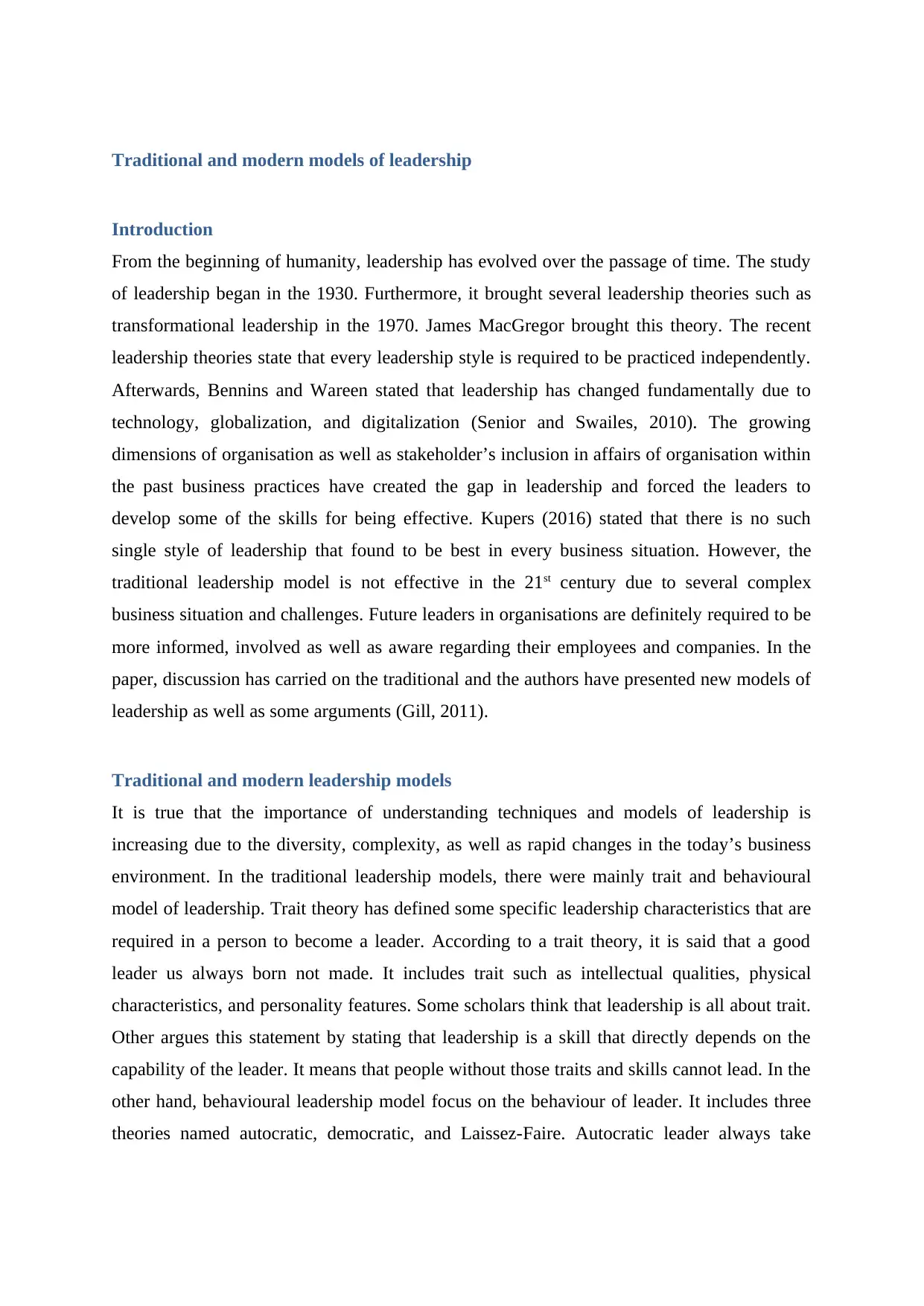
Traditional and modern models of leadership
Introduction
From the beginning of humanity, leadership has evolved over the passage of time. The study
of leadership began in the 1930. Furthermore, it brought several leadership theories such as
transformational leadership in the 1970. James MacGregor brought this theory. The recent
leadership theories state that every leadership style is required to be practiced independently.
Afterwards, Bennins and Wareen stated that leadership has changed fundamentally due to
technology, globalization, and digitalization (Senior and Swailes, 2010). The growing
dimensions of organisation as well as stakeholder’s inclusion in affairs of organisation within
the past business practices have created the gap in leadership and forced the leaders to
develop some of the skills for being effective. Kupers (2016) stated that there is no such
single style of leadership that found to be best in every business situation. However, the
traditional leadership model is not effective in the 21st century due to several complex
business situation and challenges. Future leaders in organisations are definitely required to be
more informed, involved as well as aware regarding their employees and companies. In the
paper, discussion has carried on the traditional and the authors have presented new models of
leadership as well as some arguments (Gill, 2011).
Traditional and modern leadership models
It is true that the importance of understanding techniques and models of leadership is
increasing due to the diversity, complexity, as well as rapid changes in the today’s business
environment. In the traditional leadership models, there were mainly trait and behavioural
model of leadership. Trait theory has defined some specific leadership characteristics that are
required in a person to become a leader. According to a trait theory, it is said that a good
leader us always born not made. It includes trait such as intellectual qualities, physical
characteristics, and personality features. Some scholars think that leadership is all about trait.
Other argues this statement by stating that leadership is a skill that directly depends on the
capability of the leader. It means that people without those traits and skills cannot lead. In the
other hand, behavioural leadership model focus on the behaviour of leader. It includes three
theories named autocratic, democratic, and Laissez-Faire. Autocratic leader always take
Introduction
From the beginning of humanity, leadership has evolved over the passage of time. The study
of leadership began in the 1930. Furthermore, it brought several leadership theories such as
transformational leadership in the 1970. James MacGregor brought this theory. The recent
leadership theories state that every leadership style is required to be practiced independently.
Afterwards, Bennins and Wareen stated that leadership has changed fundamentally due to
technology, globalization, and digitalization (Senior and Swailes, 2010). The growing
dimensions of organisation as well as stakeholder’s inclusion in affairs of organisation within
the past business practices have created the gap in leadership and forced the leaders to
develop some of the skills for being effective. Kupers (2016) stated that there is no such
single style of leadership that found to be best in every business situation. However, the
traditional leadership model is not effective in the 21st century due to several complex
business situation and challenges. Future leaders in organisations are definitely required to be
more informed, involved as well as aware regarding their employees and companies. In the
paper, discussion has carried on the traditional and the authors have presented new models of
leadership as well as some arguments (Gill, 2011).
Traditional and modern leadership models
It is true that the importance of understanding techniques and models of leadership is
increasing due to the diversity, complexity, as well as rapid changes in the today’s business
environment. In the traditional leadership models, there were mainly trait and behavioural
model of leadership. Trait theory has defined some specific leadership characteristics that are
required in a person to become a leader. According to a trait theory, it is said that a good
leader us always born not made. It includes trait such as intellectual qualities, physical
characteristics, and personality features. Some scholars think that leadership is all about trait.
Other argues this statement by stating that leadership is a skill that directly depends on the
capability of the leader. It means that people without those traits and skills cannot lead. In the
other hand, behavioural leadership model focus on the behaviour of leader. It includes three
theories named autocratic, democratic, and Laissez-Faire. Autocratic leader always take
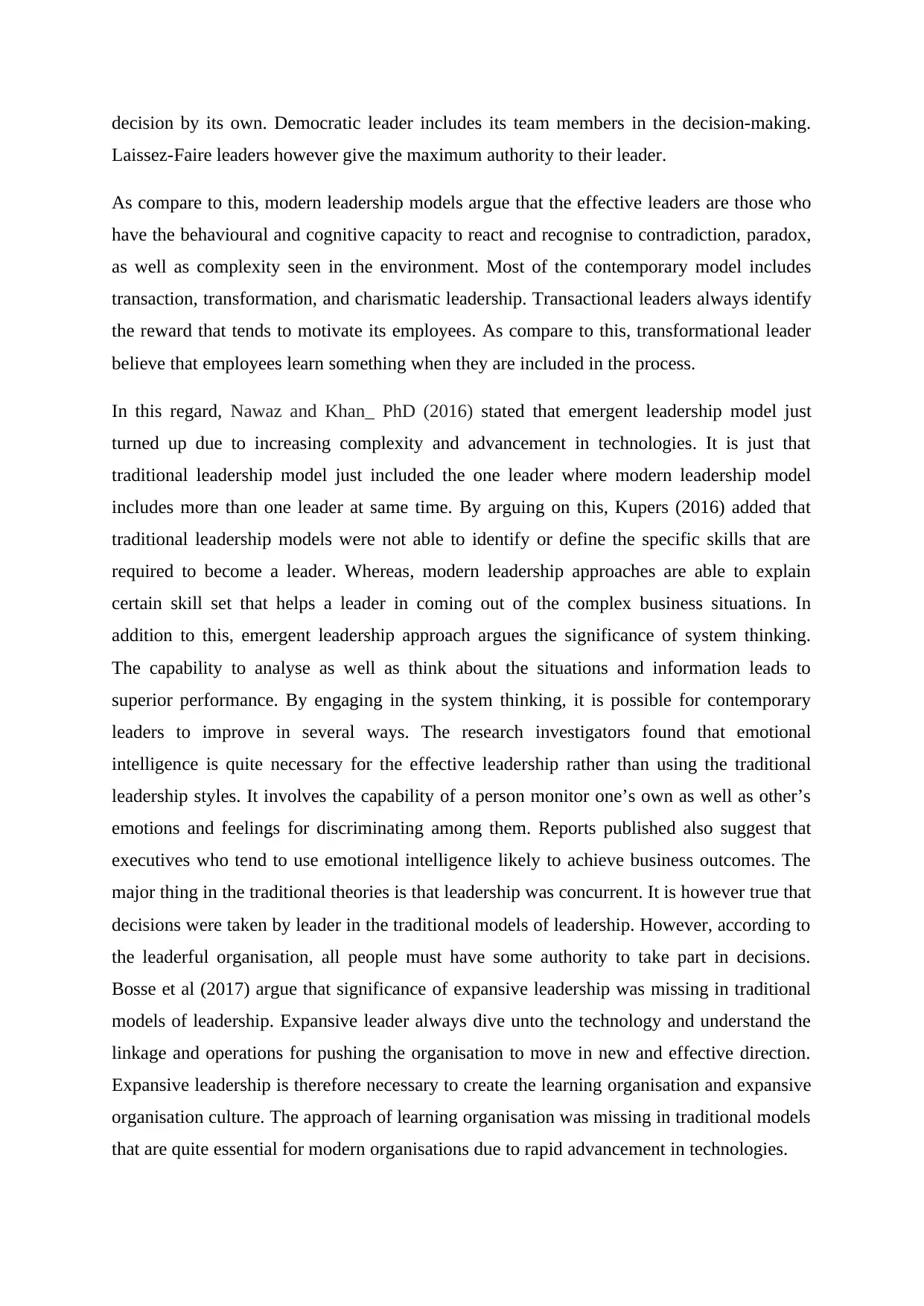
decision by its own. Democratic leader includes its team members in the decision-making.
Laissez-Faire leaders however give the maximum authority to their leader.
As compare to this, modern leadership models argue that the effective leaders are those who
have the behavioural and cognitive capacity to react and recognise to contradiction, paradox,
as well as complexity seen in the environment. Most of the contemporary model includes
transaction, transformation, and charismatic leadership. Transactional leaders always identify
the reward that tends to motivate its employees. As compare to this, transformational leader
believe that employees learn something when they are included in the process.
In this regard, Nawaz and Khan_ PhD (2016) stated that emergent leadership model just
turned up due to increasing complexity and advancement in technologies. It is just that
traditional leadership model just included the one leader where modern leadership model
includes more than one leader at same time. By arguing on this, Kupers (2016) added that
traditional leadership models were not able to identify or define the specific skills that are
required to become a leader. Whereas, modern leadership approaches are able to explain
certain skill set that helps a leader in coming out of the complex business situations. In
addition to this, emergent leadership approach argues the significance of system thinking.
The capability to analyse as well as think about the situations and information leads to
superior performance. By engaging in the system thinking, it is possible for contemporary
leaders to improve in several ways. The research investigators found that emotional
intelligence is quite necessary for the effective leadership rather than using the traditional
leadership styles. It involves the capability of a person monitor one’s own as well as other’s
emotions and feelings for discriminating among them. Reports published also suggest that
executives who tend to use emotional intelligence likely to achieve business outcomes. The
major thing in the traditional theories is that leadership was concurrent. It is however true that
decisions were taken by leader in the traditional models of leadership. However, according to
the leaderful organisation, all people must have some authority to take part in decisions.
Bosse et al (2017) argue that significance of expansive leadership was missing in traditional
models of leadership. Expansive leader always dive unto the technology and understand the
linkage and operations for pushing the organisation to move in new and effective direction.
Expansive leadership is therefore necessary to create the learning organisation and expansive
organisation culture. The approach of learning organisation was missing in traditional models
that are quite essential for modern organisations due to rapid advancement in technologies.
Laissez-Faire leaders however give the maximum authority to their leader.
As compare to this, modern leadership models argue that the effective leaders are those who
have the behavioural and cognitive capacity to react and recognise to contradiction, paradox,
as well as complexity seen in the environment. Most of the contemporary model includes
transaction, transformation, and charismatic leadership. Transactional leaders always identify
the reward that tends to motivate its employees. As compare to this, transformational leader
believe that employees learn something when they are included in the process.
In this regard, Nawaz and Khan_ PhD (2016) stated that emergent leadership model just
turned up due to increasing complexity and advancement in technologies. It is just that
traditional leadership model just included the one leader where modern leadership model
includes more than one leader at same time. By arguing on this, Kupers (2016) added that
traditional leadership models were not able to identify or define the specific skills that are
required to become a leader. Whereas, modern leadership approaches are able to explain
certain skill set that helps a leader in coming out of the complex business situations. In
addition to this, emergent leadership approach argues the significance of system thinking.
The capability to analyse as well as think about the situations and information leads to
superior performance. By engaging in the system thinking, it is possible for contemporary
leaders to improve in several ways. The research investigators found that emotional
intelligence is quite necessary for the effective leadership rather than using the traditional
leadership styles. It involves the capability of a person monitor one’s own as well as other’s
emotions and feelings for discriminating among them. Reports published also suggest that
executives who tend to use emotional intelligence likely to achieve business outcomes. The
major thing in the traditional theories is that leadership was concurrent. It is however true that
decisions were taken by leader in the traditional models of leadership. However, according to
the leaderful organisation, all people must have some authority to take part in decisions.
Bosse et al (2017) argue that significance of expansive leadership was missing in traditional
models of leadership. Expansive leader always dive unto the technology and understand the
linkage and operations for pushing the organisation to move in new and effective direction.
Expansive leadership is therefore necessary to create the learning organisation and expansive
organisation culture. The approach of learning organisation was missing in traditional models
that are quite essential for modern organisations due to rapid advancement in technologies.
⊘ This is a preview!⊘
Do you want full access?
Subscribe today to unlock all pages.

Trusted by 1+ million students worldwide
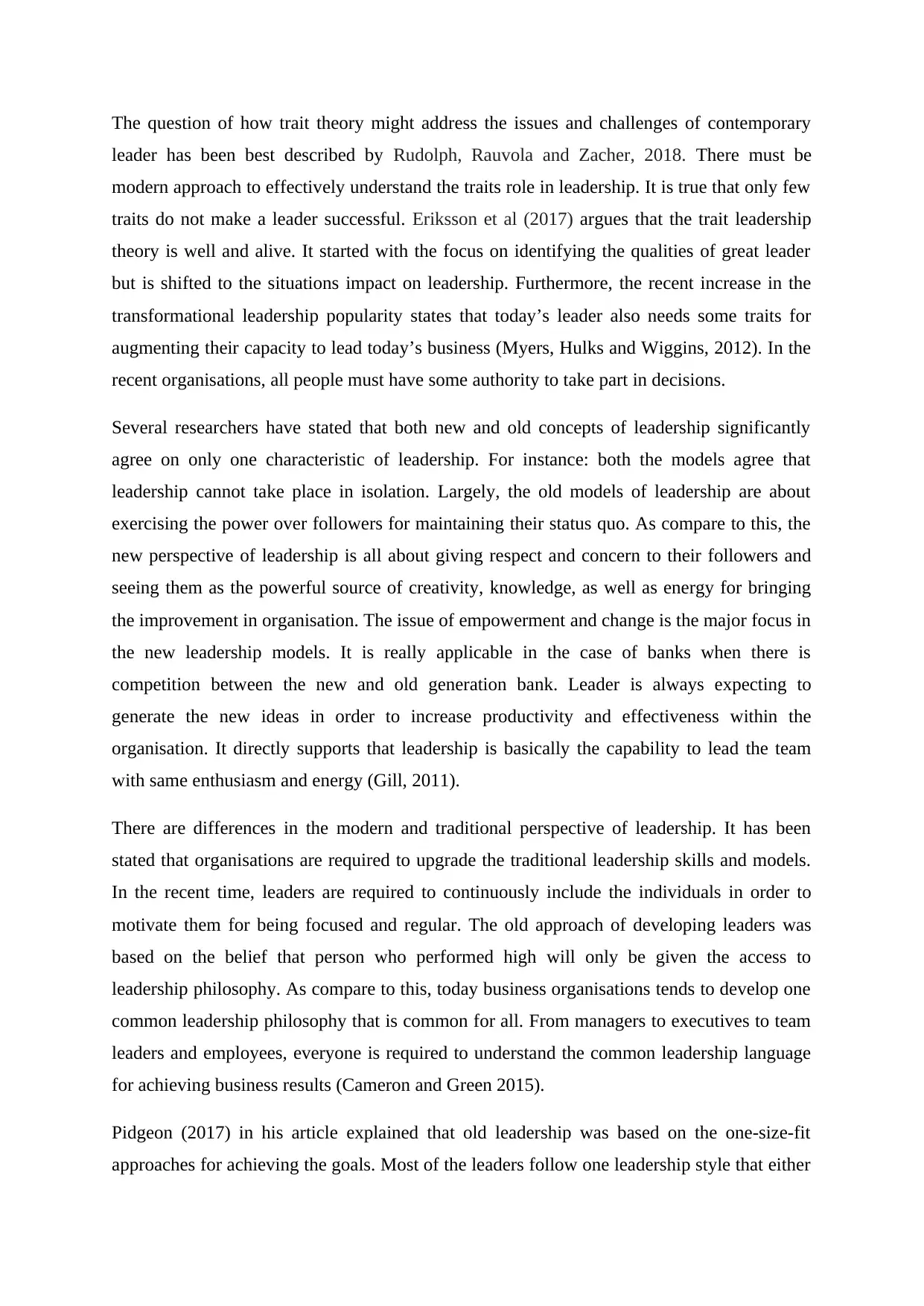
The question of how trait theory might address the issues and challenges of contemporary
leader has been best described by Rudolph, Rauvola and Zacher, 2018. There must be
modern approach to effectively understand the traits role in leadership. It is true that only few
traits do not make a leader successful. Eriksson et al (2017) argues that the trait leadership
theory is well and alive. It started with the focus on identifying the qualities of great leader
but is shifted to the situations impact on leadership. Furthermore, the recent increase in the
transformational leadership popularity states that today’s leader also needs some traits for
augmenting their capacity to lead today’s business (Myers, Hulks and Wiggins, 2012). In the
recent organisations, all people must have some authority to take part in decisions.
Several researchers have stated that both new and old concepts of leadership significantly
agree on only one characteristic of leadership. For instance: both the models agree that
leadership cannot take place in isolation. Largely, the old models of leadership are about
exercising the power over followers for maintaining their status quo. As compare to this, the
new perspective of leadership is all about giving respect and concern to their followers and
seeing them as the powerful source of creativity, knowledge, as well as energy for bringing
the improvement in organisation. The issue of empowerment and change is the major focus in
the new leadership models. It is really applicable in the case of banks when there is
competition between the new and old generation bank. Leader is always expecting to
generate the new ideas in order to increase productivity and effectiveness within the
organisation. It directly supports that leadership is basically the capability to lead the team
with same enthusiasm and energy (Gill, 2011).
There are differences in the modern and traditional perspective of leadership. It has been
stated that organisations are required to upgrade the traditional leadership skills and models.
In the recent time, leaders are required to continuously include the individuals in order to
motivate them for being focused and regular. The old approach of developing leaders was
based on the belief that person who performed high will only be given the access to
leadership philosophy. As compare to this, today business organisations tends to develop one
common leadership philosophy that is common for all. From managers to executives to team
leaders and employees, everyone is required to understand the common leadership language
for achieving business results (Cameron and Green 2015).
Pidgeon (2017) in his article explained that old leadership was based on the one-size-fit
approaches for achieving the goals. Most of the leaders follow one leadership style that either
leader has been best described by Rudolph, Rauvola and Zacher, 2018. There must be
modern approach to effectively understand the traits role in leadership. It is true that only few
traits do not make a leader successful. Eriksson et al (2017) argues that the trait leadership
theory is well and alive. It started with the focus on identifying the qualities of great leader
but is shifted to the situations impact on leadership. Furthermore, the recent increase in the
transformational leadership popularity states that today’s leader also needs some traits for
augmenting their capacity to lead today’s business (Myers, Hulks and Wiggins, 2012). In the
recent organisations, all people must have some authority to take part in decisions.
Several researchers have stated that both new and old concepts of leadership significantly
agree on only one characteristic of leadership. For instance: both the models agree that
leadership cannot take place in isolation. Largely, the old models of leadership are about
exercising the power over followers for maintaining their status quo. As compare to this, the
new perspective of leadership is all about giving respect and concern to their followers and
seeing them as the powerful source of creativity, knowledge, as well as energy for bringing
the improvement in organisation. The issue of empowerment and change is the major focus in
the new leadership models. It is really applicable in the case of banks when there is
competition between the new and old generation bank. Leader is always expecting to
generate the new ideas in order to increase productivity and effectiveness within the
organisation. It directly supports that leadership is basically the capability to lead the team
with same enthusiasm and energy (Gill, 2011).
There are differences in the modern and traditional perspective of leadership. It has been
stated that organisations are required to upgrade the traditional leadership skills and models.
In the recent time, leaders are required to continuously include the individuals in order to
motivate them for being focused and regular. The old approach of developing leaders was
based on the belief that person who performed high will only be given the access to
leadership philosophy. As compare to this, today business organisations tends to develop one
common leadership philosophy that is common for all. From managers to executives to team
leaders and employees, everyone is required to understand the common leadership language
for achieving business results (Cameron and Green 2015).
Pidgeon (2017) in his article explained that old leadership was based on the one-size-fit
approaches for achieving the goals. Most of the leaders follow one leadership style that either
Paraphrase This Document
Need a fresh take? Get an instant paraphrase of this document with our AI Paraphraser
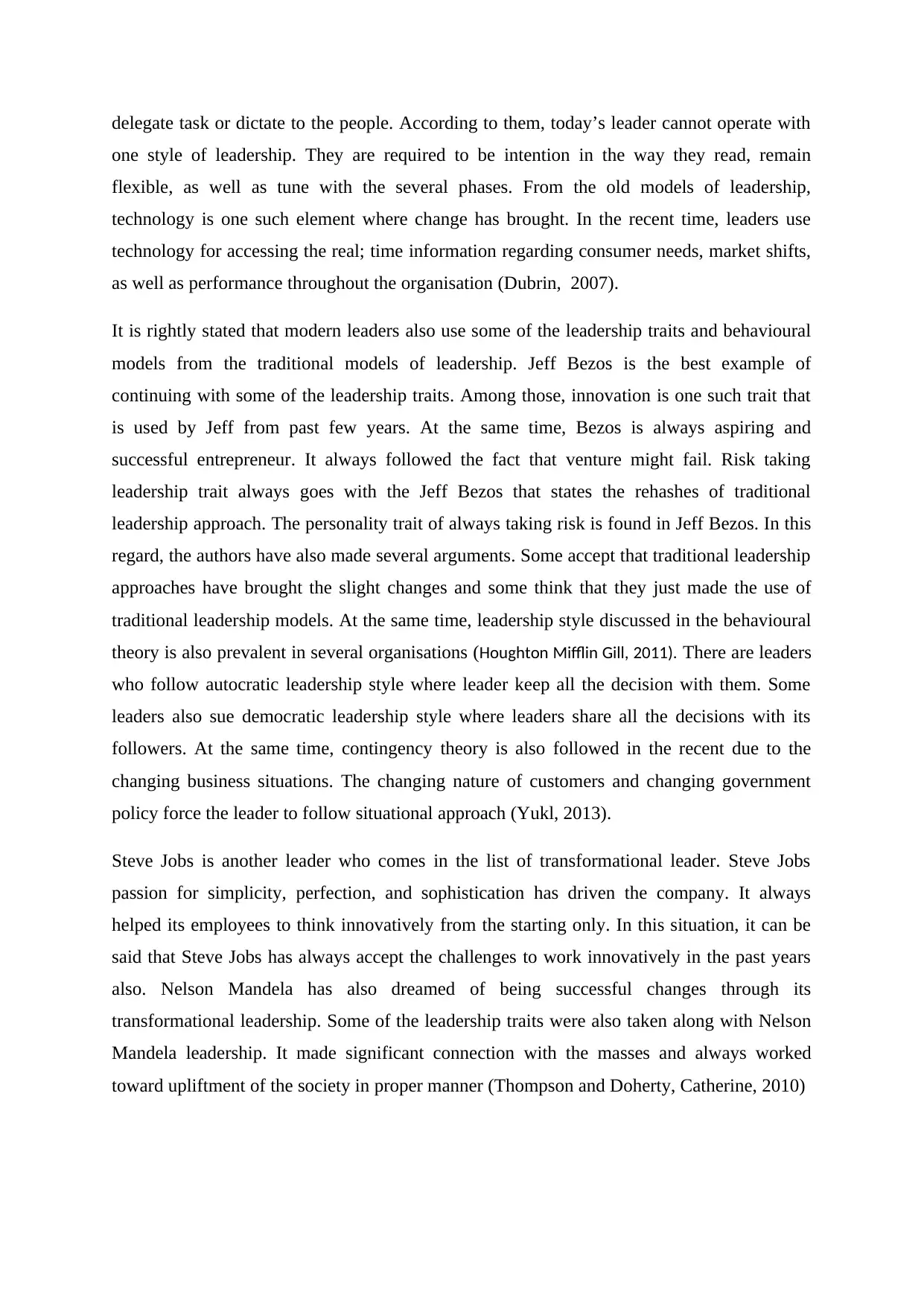
delegate task or dictate to the people. According to them, today’s leader cannot operate with
one style of leadership. They are required to be intention in the way they read, remain
flexible, as well as tune with the several phases. From the old models of leadership,
technology is one such element where change has brought. In the recent time, leaders use
technology for accessing the real; time information regarding consumer needs, market shifts,
as well as performance throughout the organisation (Dubrin, 2007).
It is rightly stated that modern leaders also use some of the leadership traits and behavioural
models from the traditional models of leadership. Jeff Bezos is the best example of
continuing with some of the leadership traits. Among those, innovation is one such trait that
is used by Jeff from past few years. At the same time, Bezos is always aspiring and
successful entrepreneur. It always followed the fact that venture might fail. Risk taking
leadership trait always goes with the Jeff Bezos that states the rehashes of traditional
leadership approach. The personality trait of always taking risk is found in Jeff Bezos. In this
regard, the authors have also made several arguments. Some accept that traditional leadership
approaches have brought the slight changes and some think that they just made the use of
traditional leadership models. At the same time, leadership style discussed in the behavioural
theory is also prevalent in several organisations (Houghton Mifflin Gill, 2011). There are leaders
who follow autocratic leadership style where leader keep all the decision with them. Some
leaders also sue democratic leadership style where leaders share all the decisions with its
followers. At the same time, contingency theory is also followed in the recent due to the
changing business situations. The changing nature of customers and changing government
policy force the leader to follow situational approach (Yukl, 2013).
Steve Jobs is another leader who comes in the list of transformational leader. Steve Jobs
passion for simplicity, perfection, and sophistication has driven the company. It always
helped its employees to think innovatively from the starting only. In this situation, it can be
said that Steve Jobs has always accept the challenges to work innovatively in the past years
also. Nelson Mandela has also dreamed of being successful changes through its
transformational leadership. Some of the leadership traits were also taken along with Nelson
Mandela leadership. It made significant connection with the masses and always worked
toward upliftment of the society in proper manner (Thompson and Doherty, Catherine, 2010)
one style of leadership. They are required to be intention in the way they read, remain
flexible, as well as tune with the several phases. From the old models of leadership,
technology is one such element where change has brought. In the recent time, leaders use
technology for accessing the real; time information regarding consumer needs, market shifts,
as well as performance throughout the organisation (Dubrin, 2007).
It is rightly stated that modern leaders also use some of the leadership traits and behavioural
models from the traditional models of leadership. Jeff Bezos is the best example of
continuing with some of the leadership traits. Among those, innovation is one such trait that
is used by Jeff from past few years. At the same time, Bezos is always aspiring and
successful entrepreneur. It always followed the fact that venture might fail. Risk taking
leadership trait always goes with the Jeff Bezos that states the rehashes of traditional
leadership approach. The personality trait of always taking risk is found in Jeff Bezos. In this
regard, the authors have also made several arguments. Some accept that traditional leadership
approaches have brought the slight changes and some think that they just made the use of
traditional leadership models. At the same time, leadership style discussed in the behavioural
theory is also prevalent in several organisations (Houghton Mifflin Gill, 2011). There are leaders
who follow autocratic leadership style where leader keep all the decision with them. Some
leaders also sue democratic leadership style where leaders share all the decisions with its
followers. At the same time, contingency theory is also followed in the recent due to the
changing business situations. The changing nature of customers and changing government
policy force the leader to follow situational approach (Yukl, 2013).
Steve Jobs is another leader who comes in the list of transformational leader. Steve Jobs
passion for simplicity, perfection, and sophistication has driven the company. It always
helped its employees to think innovatively from the starting only. In this situation, it can be
said that Steve Jobs has always accept the challenges to work innovatively in the past years
also. Nelson Mandela has also dreamed of being successful changes through its
transformational leadership. Some of the leadership traits were also taken along with Nelson
Mandela leadership. It made significant connection with the masses and always worked
toward upliftment of the society in proper manner (Thompson and Doherty, Catherine, 2010)
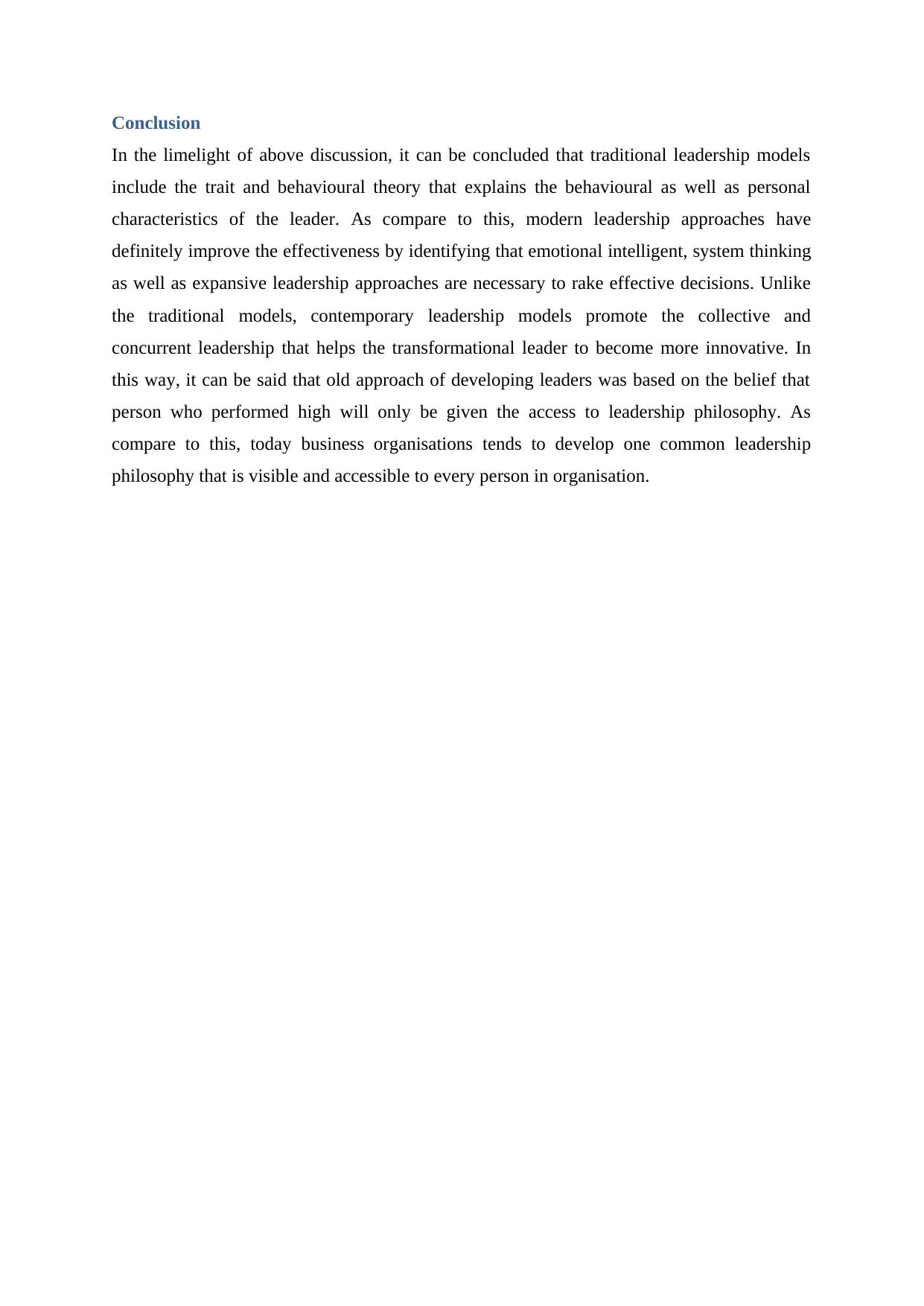
Conclusion
In the limelight of above discussion, it can be concluded that traditional leadership models
include the trait and behavioural theory that explains the behavioural as well as personal
characteristics of the leader. As compare to this, modern leadership approaches have
definitely improve the effectiveness by identifying that emotional intelligent, system thinking
as well as expansive leadership approaches are necessary to rake effective decisions. Unlike
the traditional models, contemporary leadership models promote the collective and
concurrent leadership that helps the transformational leader to become more innovative. In
this way, it can be said that old approach of developing leaders was based on the belief that
person who performed high will only be given the access to leadership philosophy. As
compare to this, today business organisations tends to develop one common leadership
philosophy that is visible and accessible to every person in organisation.
In the limelight of above discussion, it can be concluded that traditional leadership models
include the trait and behavioural theory that explains the behavioural as well as personal
characteristics of the leader. As compare to this, modern leadership approaches have
definitely improve the effectiveness by identifying that emotional intelligent, system thinking
as well as expansive leadership approaches are necessary to rake effective decisions. Unlike
the traditional models, contemporary leadership models promote the collective and
concurrent leadership that helps the transformational leader to become more innovative. In
this way, it can be said that old approach of developing leaders was based on the belief that
person who performed high will only be given the access to leadership philosophy. As
compare to this, today business organisations tends to develop one common leadership
philosophy that is visible and accessible to every person in organisation.
⊘ This is a preview!⊘
Do you want full access?
Subscribe today to unlock all pages.

Trusted by 1+ million students worldwide
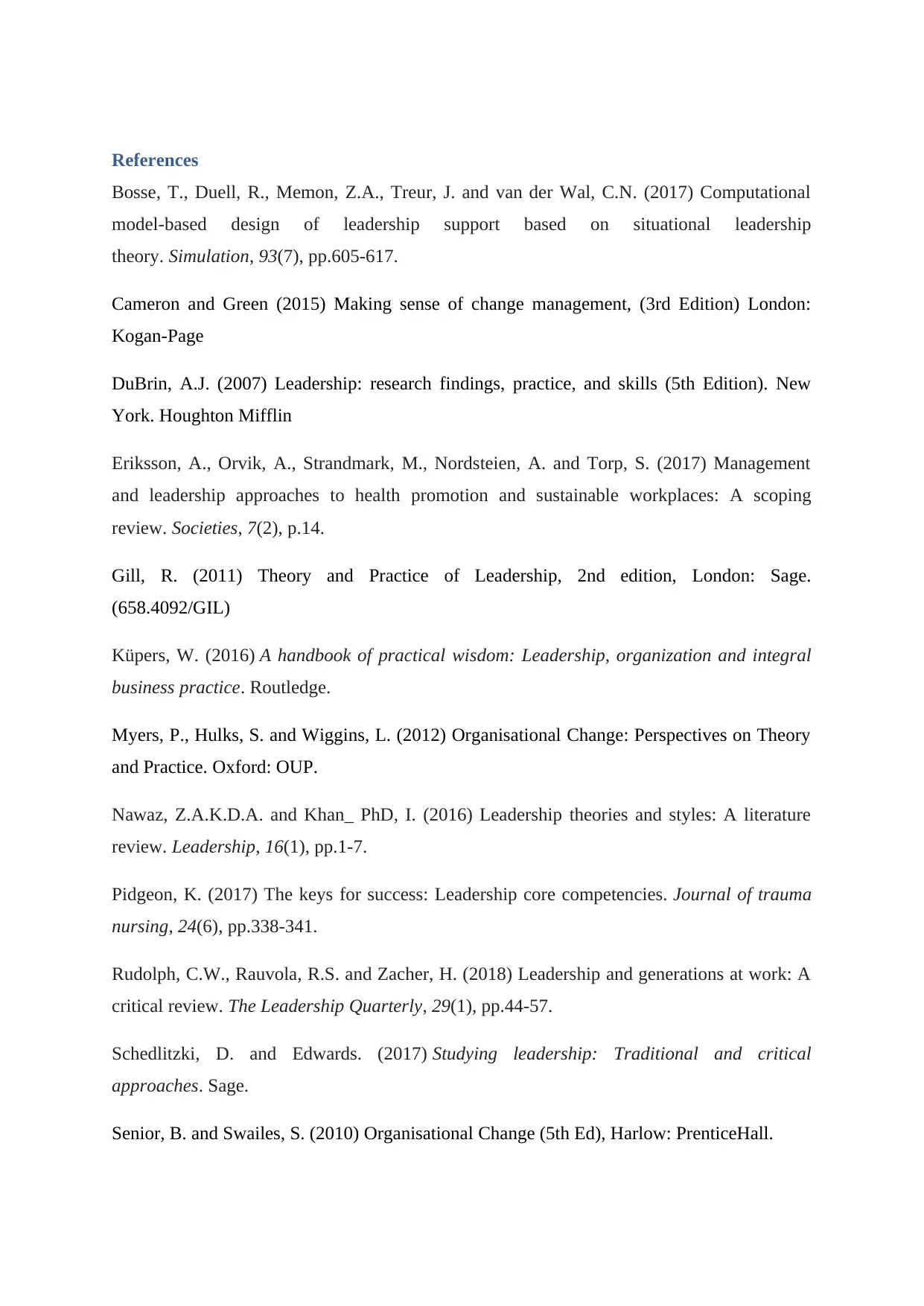
References
Bosse, T., Duell, R., Memon, Z.A., Treur, J. and van der Wal, C.N. (2017) Computational
model-based design of leadership support based on situational leadership
theory. Simulation, 93(7), pp.605-617.
Cameron and Green (2015) Making sense of change management, (3rd Edition) London:
Kogan-Page
DuBrin, A.J. (2007) Leadership: research findings, practice, and skills (5th Edition). New
York. Houghton Mifflin
Eriksson, A., Orvik, A., Strandmark, M., Nordsteien, A. and Torp, S. (2017) Management
and leadership approaches to health promotion and sustainable workplaces: A scoping
review. Societies, 7(2), p.14.
Gill, R. (2011) Theory and Practice of Leadership, 2nd edition, London: Sage.
(658.4092/GIL)
Küpers, W. (2016) A handbook of practical wisdom: Leadership, organization and integral
business practice. Routledge.
Myers, P., Hulks, S. and Wiggins, L. (2012) Organisational Change: Perspectives on Theory
and Practice. Oxford: OUP.
Nawaz, Z.A.K.D.A. and Khan_ PhD, I. (2016) Leadership theories and styles: A literature
review. Leadership, 16(1), pp.1-7.
Pidgeon, K. (2017) The keys for success: Leadership core competencies. Journal of trauma
nursing, 24(6), pp.338-341.
Rudolph, C.W., Rauvola, R.S. and Zacher, H. (2018) Leadership and generations at work: A
critical review. The Leadership Quarterly, 29(1), pp.44-57.
Schedlitzki, D. and Edwards. (2017) Studying leadership: Traditional and critical
approaches. Sage.
Senior, B. and Swailes, S. (2010) Organisational Change (5th Ed), Harlow: PrenticeHall.
Bosse, T., Duell, R., Memon, Z.A., Treur, J. and van der Wal, C.N. (2017) Computational
model-based design of leadership support based on situational leadership
theory. Simulation, 93(7), pp.605-617.
Cameron and Green (2015) Making sense of change management, (3rd Edition) London:
Kogan-Page
DuBrin, A.J. (2007) Leadership: research findings, practice, and skills (5th Edition). New
York. Houghton Mifflin
Eriksson, A., Orvik, A., Strandmark, M., Nordsteien, A. and Torp, S. (2017) Management
and leadership approaches to health promotion and sustainable workplaces: A scoping
review. Societies, 7(2), p.14.
Gill, R. (2011) Theory and Practice of Leadership, 2nd edition, London: Sage.
(658.4092/GIL)
Küpers, W. (2016) A handbook of practical wisdom: Leadership, organization and integral
business practice. Routledge.
Myers, P., Hulks, S. and Wiggins, L. (2012) Organisational Change: Perspectives on Theory
and Practice. Oxford: OUP.
Nawaz, Z.A.K.D.A. and Khan_ PhD, I. (2016) Leadership theories and styles: A literature
review. Leadership, 16(1), pp.1-7.
Pidgeon, K. (2017) The keys for success: Leadership core competencies. Journal of trauma
nursing, 24(6), pp.338-341.
Rudolph, C.W., Rauvola, R.S. and Zacher, H. (2018) Leadership and generations at work: A
critical review. The Leadership Quarterly, 29(1), pp.44-57.
Schedlitzki, D. and Edwards. (2017) Studying leadership: Traditional and critical
approaches. Sage.
Senior, B. and Swailes, S. (2010) Organisational Change (5th Ed), Harlow: PrenticeHall.
Paraphrase This Document
Need a fresh take? Get an instant paraphrase of this document with our AI Paraphraser
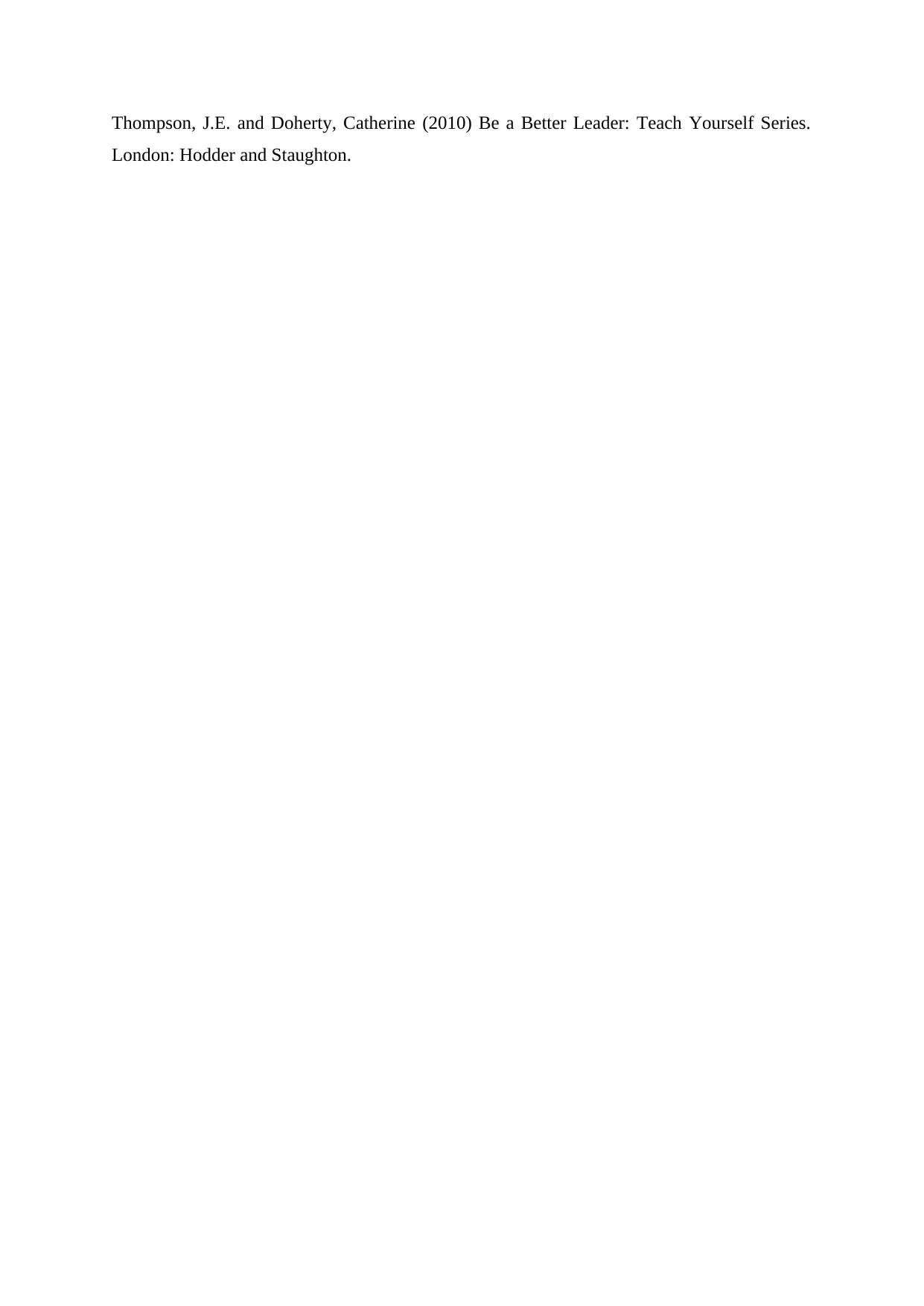
Thompson, J.E. and Doherty, Catherine (2010) Be a Better Leader: Teach Yourself Series.
London: Hodder and Staughton.
London: Hodder and Staughton.
1 out of 8
Related Documents
Your All-in-One AI-Powered Toolkit for Academic Success.
+13062052269
info@desklib.com
Available 24*7 on WhatsApp / Email
![[object Object]](/_next/static/media/star-bottom.7253800d.svg)
Unlock your academic potential
Copyright © 2020–2026 A2Z Services. All Rights Reserved. Developed and managed by ZUCOL.




